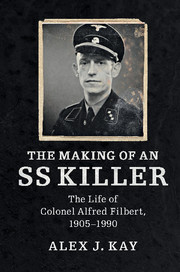Book contents
- Frontmatter
- Contents
- List of illustrations
- List of tables
- Acknowledgements
- List of abbreviations
- Glossary
- Introduction
- 1 ‘I went to school with quite a number of Jewish co-religionists and never knew hatred for Jews’: childhood, youth and early adulthood, 1905–1932
- 2 ‘In terms of his character he is irreproachable in every respect’: Nazi Party membership and career in the SS Security Service, 1932–1939
- 3 ‘Pity that the scoundrel didn't perish’: brother's imprisonment and career stagnation, 1939–1941
- 4 ‘So, we've finished off the first Jews’: SS-Einsatzkommando 9 and deployment in the East, June–July 1941
- 5 ‘In Vileyka, the Jews had to be liquidated in their entirety’: genocide of Belarusian Jewry, July–October 1941
- 6 ‘Was it thinkable that I, a jurist and a soldier, would do such a thing?’: suspension from the Reich Security Main Office and reinstatement until the war's end, 1941–1945
- 7 ‘My son, who has not yet returned home from the war’: post-war submergence and reintegration into West German society, 1945–1959
- 8 ‘A trial of this magnitude has never previously taken place before a German court’: arrest and trial, February 1959–June 1962
- 9 ‘A limited, lower middle class, status-and-promotion seeking philistine’: imprisonment and early release, 1962–1975
- 10 ‘A chess game of egos’: Wundkanal and aftermath, 1975–1990
- Concluding thoughts
- Notes
- Sources and literature cited
- Index
6 - ‘Was it thinkable that I, a jurist and a soldier, would do such a thing?’: suspension from the Reich Security Main Office and reinstatement until the war's end, 1941–1945
Published online by Cambridge University Press: 05 April 2016
- Frontmatter
- Contents
- List of illustrations
- List of tables
- Acknowledgements
- List of abbreviations
- Glossary
- Introduction
- 1 ‘I went to school with quite a number of Jewish co-religionists and never knew hatred for Jews’: childhood, youth and early adulthood, 1905–1932
- 2 ‘In terms of his character he is irreproachable in every respect’: Nazi Party membership and career in the SS Security Service, 1932–1939
- 3 ‘Pity that the scoundrel didn't perish’: brother's imprisonment and career stagnation, 1939–1941
- 4 ‘So, we've finished off the first Jews’: SS-Einsatzkommando 9 and deployment in the East, June–July 1941
- 5 ‘In Vileyka, the Jews had to be liquidated in their entirety’: genocide of Belarusian Jewry, July–October 1941
- 6 ‘Was it thinkable that I, a jurist and a soldier, would do such a thing?’: suspension from the Reich Security Main Office and reinstatement until the war's end, 1941–1945
- 7 ‘My son, who has not yet returned home from the war’: post-war submergence and reintegration into West German society, 1945–1959
- 8 ‘A trial of this magnitude has never previously taken place before a German court’: arrest and trial, February 1959–June 1962
- 9 ‘A limited, lower middle class, status-and-promotion seeking philistine’: imprisonment and early release, 1962–1975
- 10 ‘A chess game of egos’: Wundkanal and aftermath, 1975–1990
- Concluding thoughts
- Notes
- Sources and literature cited
- Index
Summary
On 2 July 1941, shortly after departing for the Soviet Union at the head of Einsatzkommando 9, Filbert had been replaced by Walter Schellenberg as group leader and deputy head of Office VI of the RSHA under Heinz Jost. In the second half of October, upon his return to Berlin from his stint in the east, Filbert was accused of having misappropriated RSHA funds. The affair impacted not only on Filbert but also on other senior members of Office VI, namely Jost – who had been fired by Heydrich as early as the beginning of September – and SS-Obersturmbannführer Friedrich Vollheim, head of Group VI C. The charges were used to remove the three of them from office. The specific charges against Filbert were twofold: first, it was claimed that Filbert had illegally retained 60,000 Reich marks in foreign currency in his office safe for his own personal use; second, he was accused of taking out ‘a dubious loan’ (einen zweifelhaften Kredit) for the purchase of a house. The interest rate agreed on for the mortgage was supposedly half a per cent lower than the rate generally applied. The house in question was a villa at 34 Waltharistraße in the Berlin suburb of Wannsee, which Filbert had moved into in 1941 (and would then ultimately purchase in 1943). Proceedings were initiated against him and he was questioned by an SS court in Berlin. He later disputed his guilt with the words: ‘Was it thinkable that I, a jurist and a soldier, would do such a thing?’
Filbert was only one of many Nazi criminals who admitted in their post-war testimony to having committed murder (albeit often on a scale much smaller than had actually been the case) but disputed having ever enriched themselves materially or financially. Franz Stangl, the former commandant of Treblinka extermination camp, endeavoured after the war to make it clear that no theft had taken place under his command. During the post-war investigation of crimes committed at the Meseritz-Obrawalde psychiatric clinic in occupied Poland, one nurse charged with poisoning patients explained:
[…] I would never have committed theft. I know that one is not supposed to do something like that. During the bad times [pre-war depression years] I was a saleswoman and I would have had easy opportunities back then to do that.
- Type
- Chapter
- Information
- The Making of an SS KillerThe Life of Colonel Alfred Filbert, 1905–1990, pp. 78 - 87Publisher: Cambridge University PressPrint publication year: 2016



